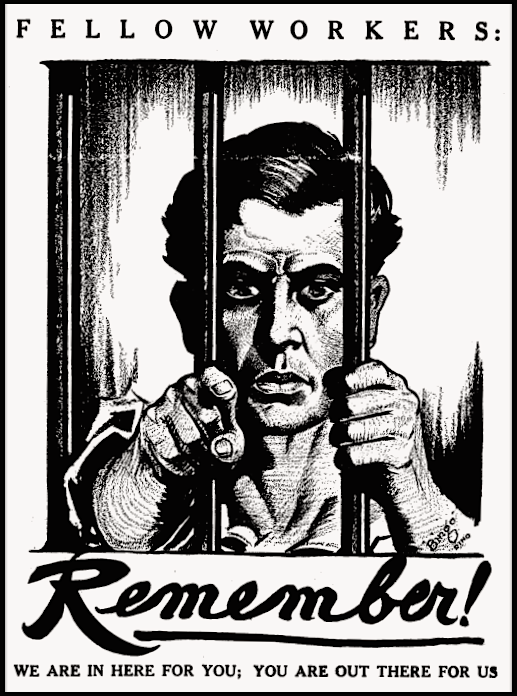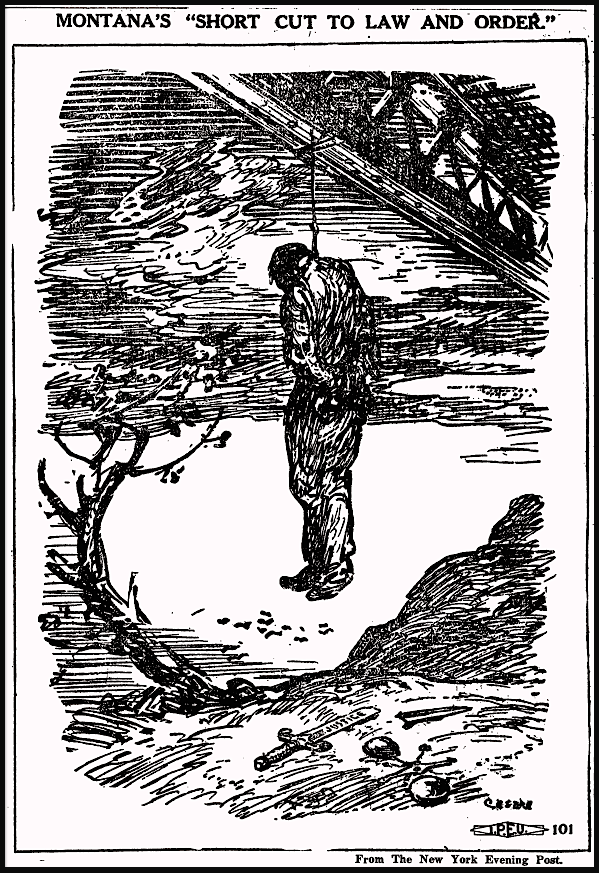Don’t worry, fellow-worker,
all we’re going to need from now on is guts.
-Frank Little
~~~~~~~~~~~~~~~~~~~~~~~~~~~~~~~~~~~~~~~~~~~~
Hellraisers Journal, Wednesday May 22, 1918
Washington, D. C. – I. W. W. to be Target of Sedition Bill
From this morning’s New York Times:
President Signs Sedition Bill
WASHINGTON. May 21, President Wilson today signed the Sedition bill giving the Government wide powers to punish disloyal acts and utterances.
From The Labor World of May 11, 1918:
———
OUTLAWS THE USE AND ADVOCACY OF VIOLENCE
———-
To Bring About Governmental, Social, Industrial or
Economic Reforms-Destruction of “Wabblies” Opens
Opportunities for Labor Unions.
———-
WASHINGTON, May 9.-The bill declared frankly to be aimed against the I. W. W., outlawing organizations which use or advocate violence to bring about “any governmental, social, industrial or economic change,” during the war, was passed Monday by the senate after brief debate and went to the house.
The bill provides that
any association, organization, society or corporation, one of whose purposes or professed purposes is to bring about any governmental, social, industrial or economic change within the United States by the use, without the authority of law, of force, violence, or physical injury to person or property, or by threats of such injury, or which teaches, advocates, defends or advises the use, without authority of law, of force, violence, or physical injury to person or property, or threats of such injury, to accomplish such change or for any other purpose, and which, during any war in which the United States is engaged, shall by any means prosecute or pursue such purpose or professed purpose, or shall so teach, advocate, advise, or defend, is hereby declared to be an “unlawful association.”
It also makes it a felony, punishable by 10 years’ imprisonment and $5,000 fine, for anyone to continue to be a member or agent of such and “unlawful association,” or who shall defend its acts.
As soon as a test case has been brought into court, the court must decide whether the I. W. W. does teach or practice “force, violence or physical injury to person or property.” It may hold that physical injury to property is practiced by the I. W. W. And then the I. W. W. will become an outlawed organization. Its members must quit their membership and their activities on behalf of the outlawed methods of the organization. Otherwise they will be arrested by the hundreds, tried as rapidly as possible, and when convicted will be put away in federal prisons.
What About Unskilled Labor.
There arises at once the problem of the casual and unskilled labor from which the “wabblies” [wobblies] have drawn their support. What will become of these men? The president’s mediation commission, in its recent report, says; ”
The I. W. W. has exercised its strongest hold in those industries and communities where employers have most resisted the trade union movement, and where some form of protest against unjust treatment was inevitable.
Can the trade union movement now go in and organize the lumberjacks, the copper miners, the longshoremen at various points, and the farm laborers in the northwest and west?
Suppose they come into the regular unions, by the thousands; will they prove an extremely radical element, and will they control the local unions and even central labor bodies at various points?
Whether legitimate strikes of organized labor would be penalized by the bill was a question raised by Senator Reed of Missouri, and Senator Walsh said there is no purpose to prohibit peaceful labor strikes.
———-
[Photograph added.]
From the Report of President’s Mediation Commission, January 9, 1918:
CAUSES OF LABOR DIFFICULTIES.
[…..]
6. Repressive dealing with manifestations of labor unrest is the source of much bitterness, turns radical labor leaders into martyrs and thus increases their following, and, worst of all, in the minds of workers tends to implicate the Government as a partisan in an economic conflict. The problem is a delicate and difficult one. There is no doubt, however, that the Bisbee and Jerome deportations, the Everett incident, the Little hanging, and similar acts of violence against workers have had a very harmful effect upon labor both in the United States and in some of the allied countries. Such incidents are attempts to deal with symptoms rather than causes. The I. W. W. has exercised its strongest hold in those industries and communities where employers have most resisted the trade-union movement and where some form of protest against unjust treatment was inevitable.
[…..]
From the American Socialist of August 11, 1917-
Law and Order in the State of Montana:
—–
WE NEVER FORGET
SOURCES
The New York Times
(New York, New York)
-May 22, 1918
https://www.nytimes.com/1918/05/22/archives/president-signs-sedition-bill.html
https://www.newspapers.com/image/20395832/
The Labor World
(Duluth, Minnesota)
-May 11, 1918
https://www.newspapers.com/image/49591982/
Jan 9, 1918: Report of President’s Mediation Commission
-to the President of the United States
United States. President’s Mediation Commission,
-William Bauchop Wilson, Chairman
U.S. Government Printing Office, 1918
https://books.google.com/books?id=bBzmAAAAMAAJ
“Repressive dealing with manifestations of labor unrest…”
https://play.google.com/books/reader?id=bBzmAAAAMAAJ&printsec=frontcover&pg=GBS.PA19
IMAGES
WWIR, In Here For You, Ralph Chaplin, Sol Aug 4, Sept 1, 1917
https://libcom.org/files/rebel-voices-2_0.pdf
p323
Frank Little, MT Law n Order, Cesare, Am Sc, Aug 11, 1917
https://www.marxists.org/history/usa/pubs/american-socialist/v4n05-aug-11-1917-TAS.pdf
See also:
Sedition Act of 1918
https://en.wikipedia.org/wiki/Sedition_Act_of_1918
Note: most modern-day sources state that President Wilson signed the Sedition Bill into law on May 16, 1918, however most of the newspaper of the day reported on May 22nd (103 papers per search at newspapers.com) that Wilson had signed the bill on the previous day, May 21st. It appears that the bill was sent to Wilson on May 16th, according to a few newspapers, and a couple of those reported that the bill was signed on that day. More research needed.
For a more in depth look at passage of the Sedition Act and role played by Senators Meyers and Walsh of Montana:
Perilous Times:
Free Speech in Wartime from the Sedition Act of 1798 to the War on Terrorism
-by Geoffrey R Stone
W. W. Norton & Company, 2004
(search separately: bourquin, choose page 160;
“department of justice sought to amend the espionage act” -pages 184-189)
https://books.google.com/books?id=S7ScI3Ia25sC
Bisbee and Jerome Deportations
https://weneverforget.org/tag/bisbee-deportation-of-1917/
https://weneverforget.org/tag/jerome-deportation-of-1917/
Everett Massacre
https://weneverforget.org/tag/everett-massacre-of-1916/
Frank Little
https://weneverforget.org/category/frank-little/
All Hell Can’t Stop Us – Twin Cities Labor Chorus
Lyrics by Ralph Chaplin
http://www.hobonickels.org/iwwsongs.htm#11a



